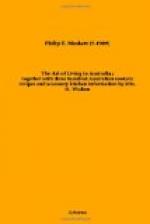I refer to the brain workers. I say large and important, because in their ranks are to be found literary men and journalists, members of the professions, active-minded, busy men of the commercial world, and the vast array of those having mental work and clerical occupations. In one of the latest books on the subject of food and diet by Dr. Burney Yeo, he remarks that it is the custom to speak of fish as an “intellectual” or “brain” food, on account of the phosphorus contained in it. But he adds that much of its reputation in this respect may be due to its being readily digested by persons of sedentary and studious habits. He proceeds to quote Louis Agassiz, the famous naturalist, who bestows upon fish the following:—“Refreshing to the organism, especially for intellectual labour; not that its use can turn an idiot into a wise or witty man, but a fish diet cannot be otherwise than favourable to brain development.”
But if fish is thus a necessary and desirable element in the dietary of our active daily life, it is not to be forgotten that it is at least equally valuable for the invalid. It is often tolerated by the stomach when the digestive powers are weakened from any cause. When the system is recruiting after any exhausting illness, it is usually amongst the earliest forms of nourishment allowed. In many chronic disorders, likewise, it is just one of those things whose place it would be impossible to fill. And, lastly, it should be ever remembered that many men whose lives are passed in a state of perfect thraldom by reason of their extravagant use of butcher’s meat would find themselves better in health, better in spirits, and better in temper, were they to curtail their allowance, substituting fish in its place.
CHAPTER XI.
ON SALADS; SALAD PLANTS AND HERBS; AND SALAD MAKING.
“A salad is A delicacy which the poorest of us ought always to command.”




